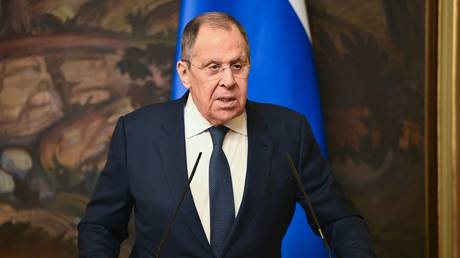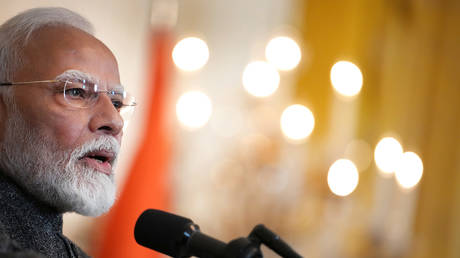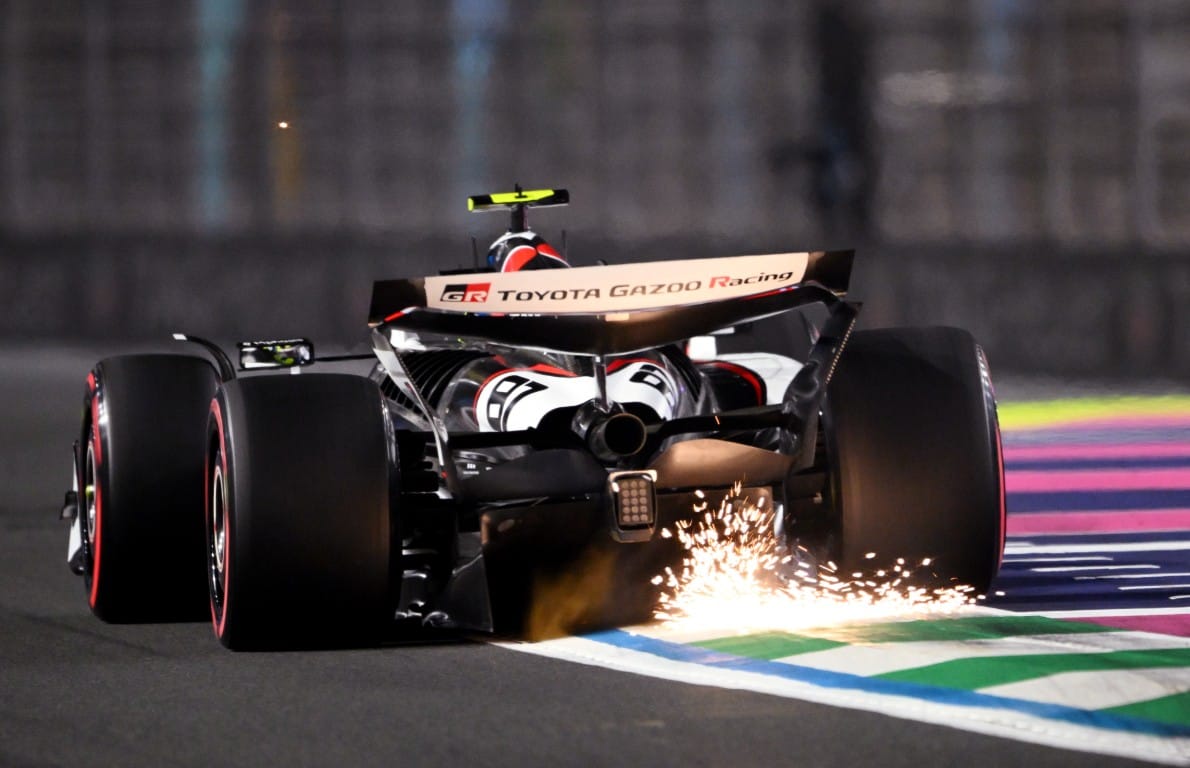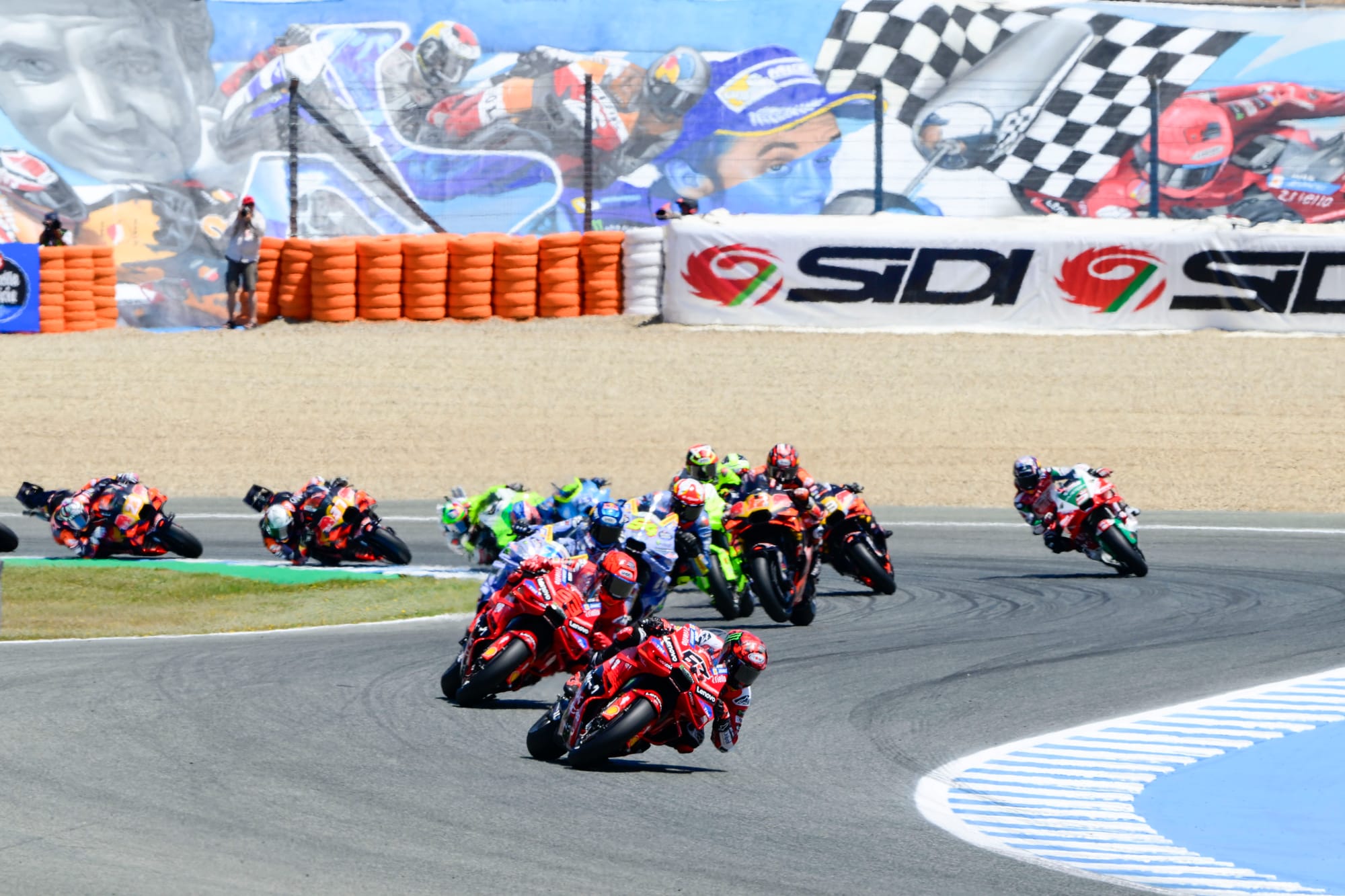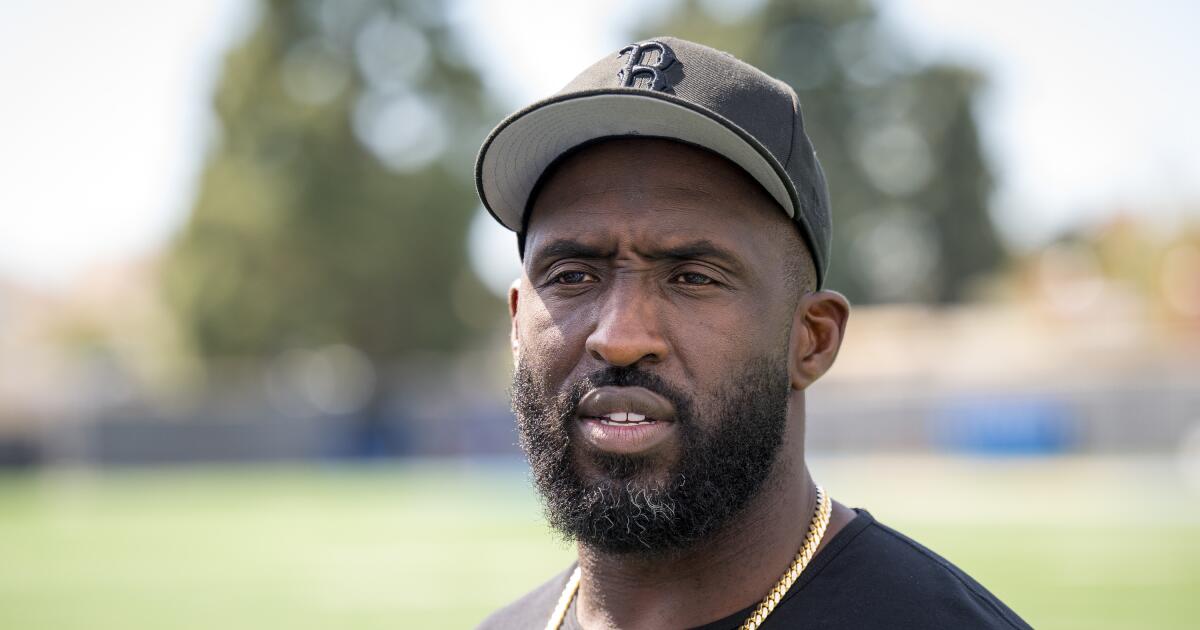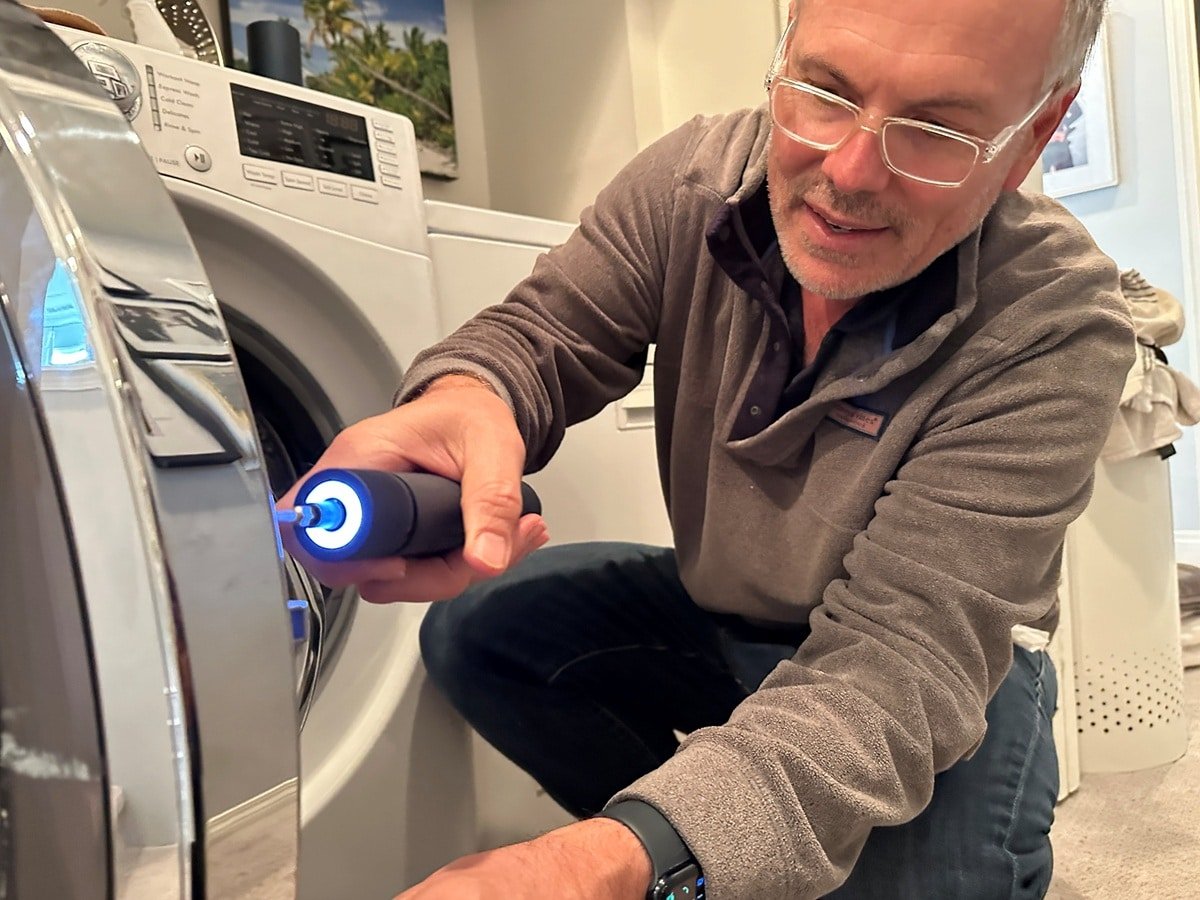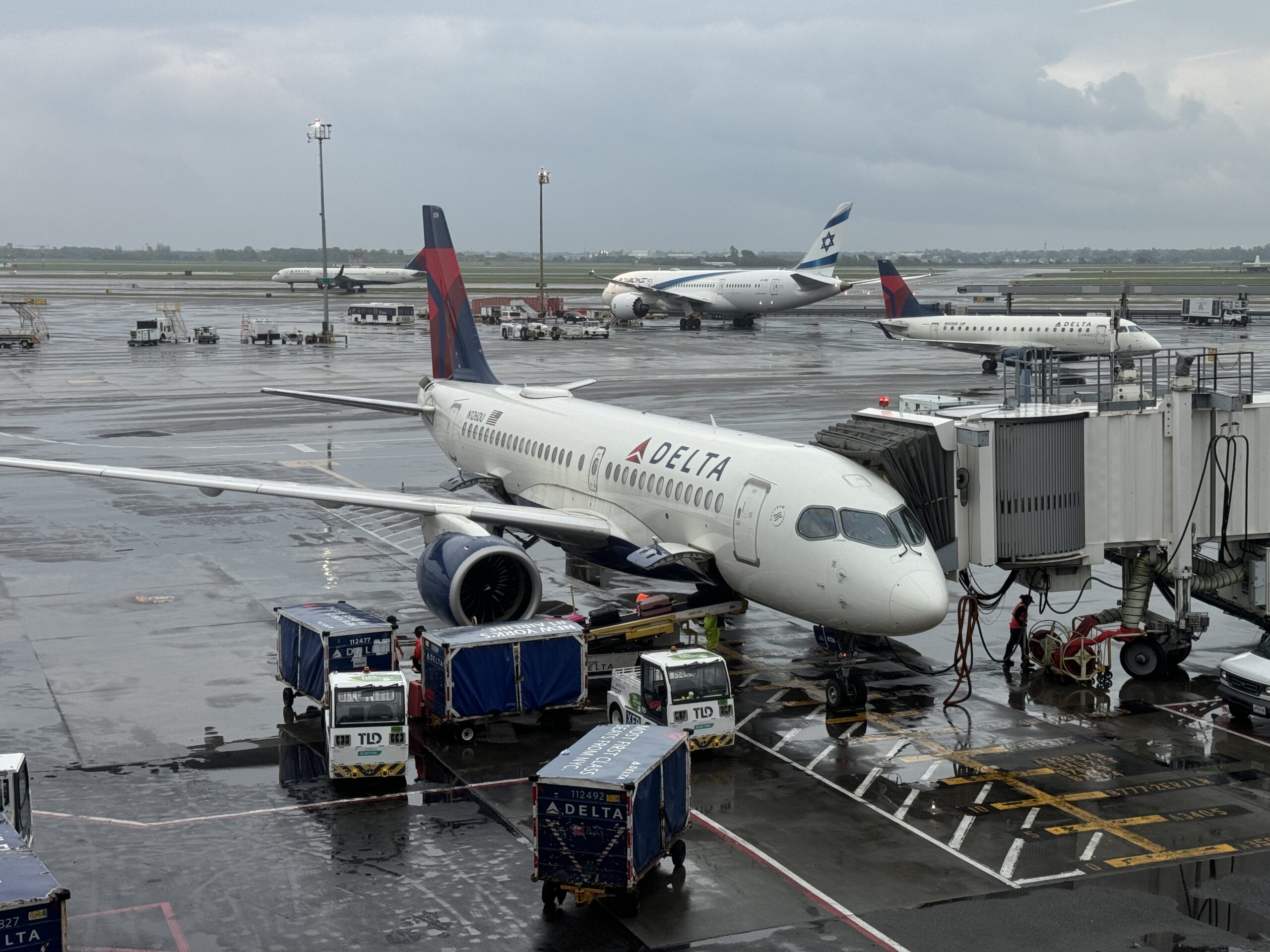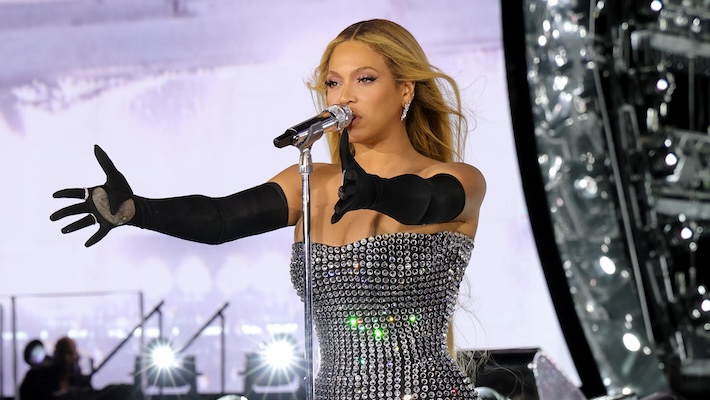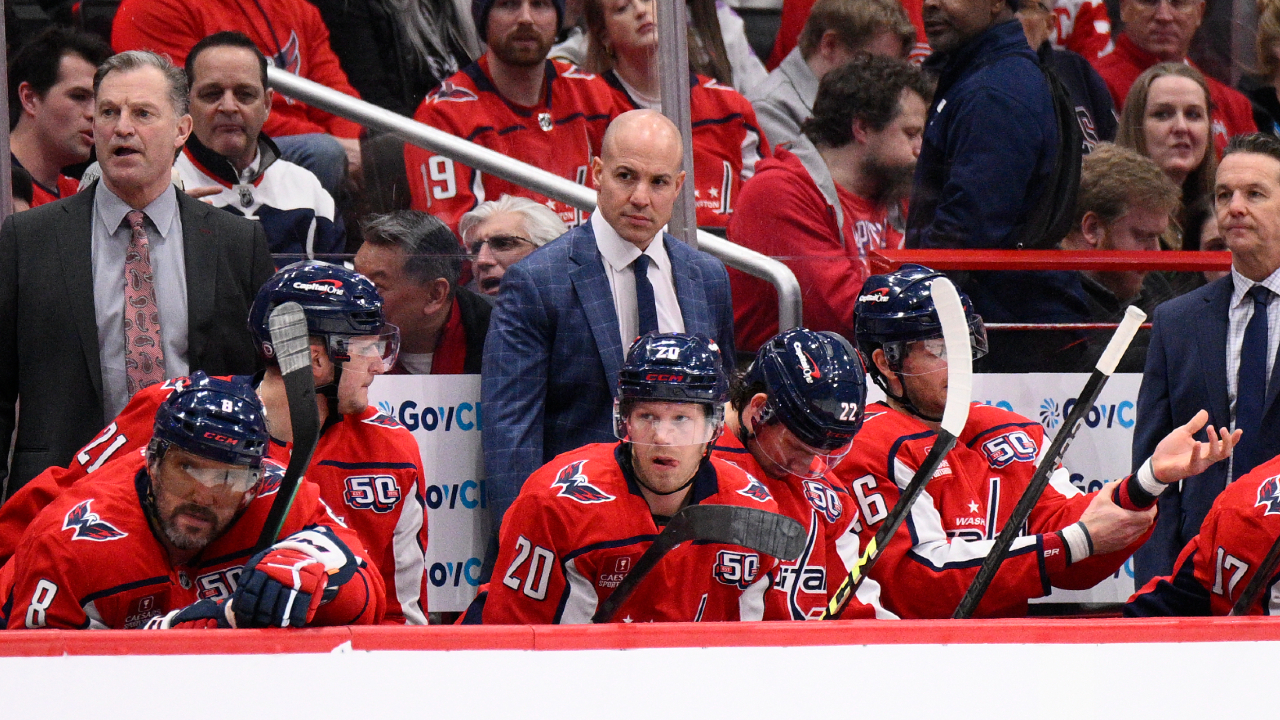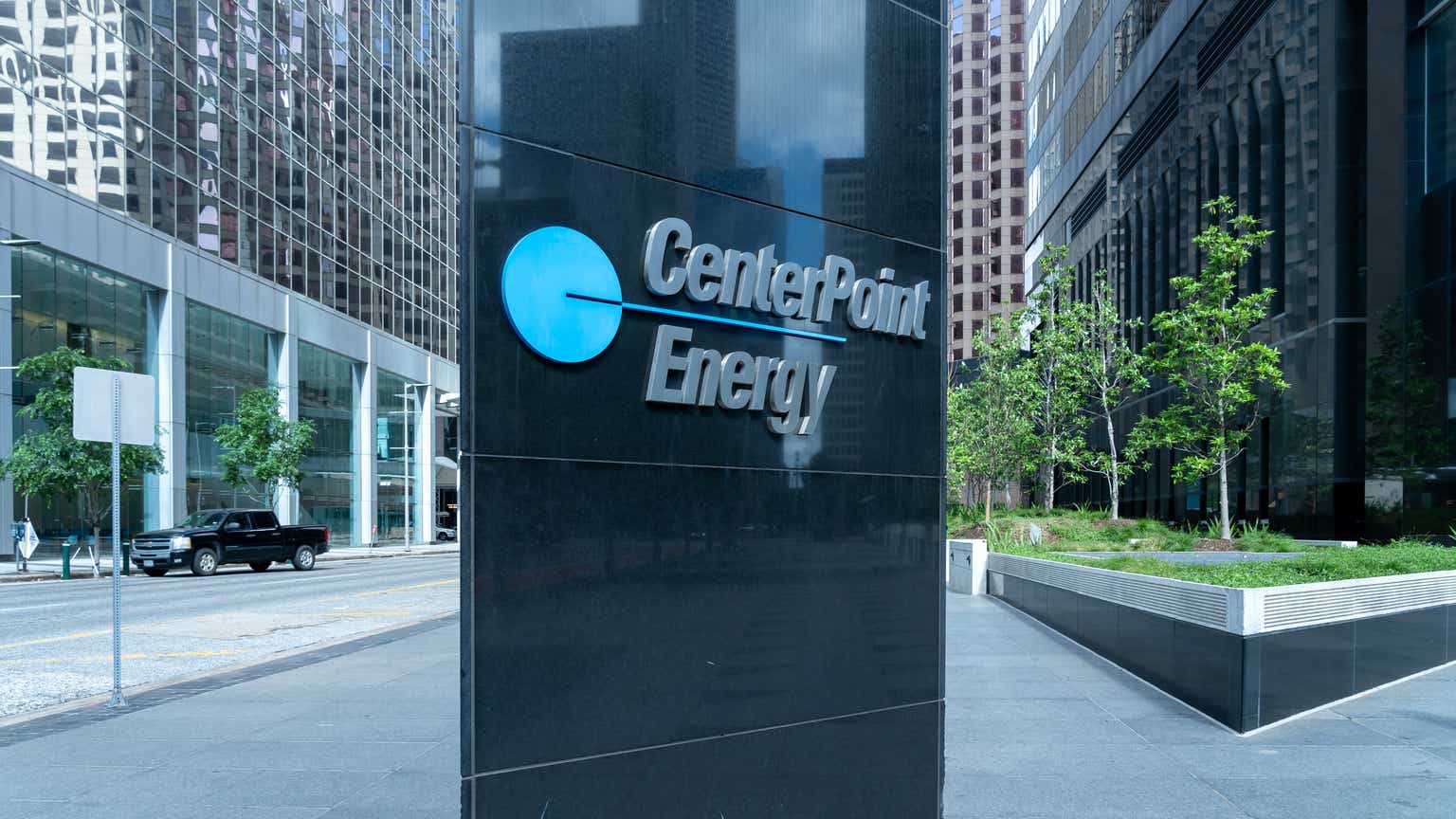Stock market news for investors: Musk to spend more time running Tesla, Rogers hopes there’s upside to sports, and more
Plus, Teck Resources sees higher demand for metals, and National Bank buys PGM Global Holdings. Here are the details for Canadian investors. The post Stock market news for investors: Musk to spend more time running Tesla, Rogers hopes there’s upside to sports, and more appeared first on MoneySense.


Build your retirement savings with 2.00% interest, tax-deferred contributions and zero fees.

Earn a guaranteed 3.55% in your RRSP when you lock in for 1 year.

See our ranking of the best RRSP accounts and rates available in Canada.
MoneySense is an award-winning magazine, helping Canadians navigate money matters since 1999. Our editorial team of trained journalists works closely with leading personal finance experts in Canada. To help you find the best financial products, we compare the offerings from over 12 major institutions, including banks, credit unions and card issuers. Learn more about our advertising and trusted partners.
Rogers hopes to ride MLSE deal, NHL rights extension to higher share price
Rogers Communications Inc Class B (TSE: RCI.B)
- Q1 profit: $280 million or 50 cents per diluted share, up from $256 million or 46 cents per share a year earlier.
- Revenue for the quarter: $4.98 billion, up from $4.90 billion a year earlier.
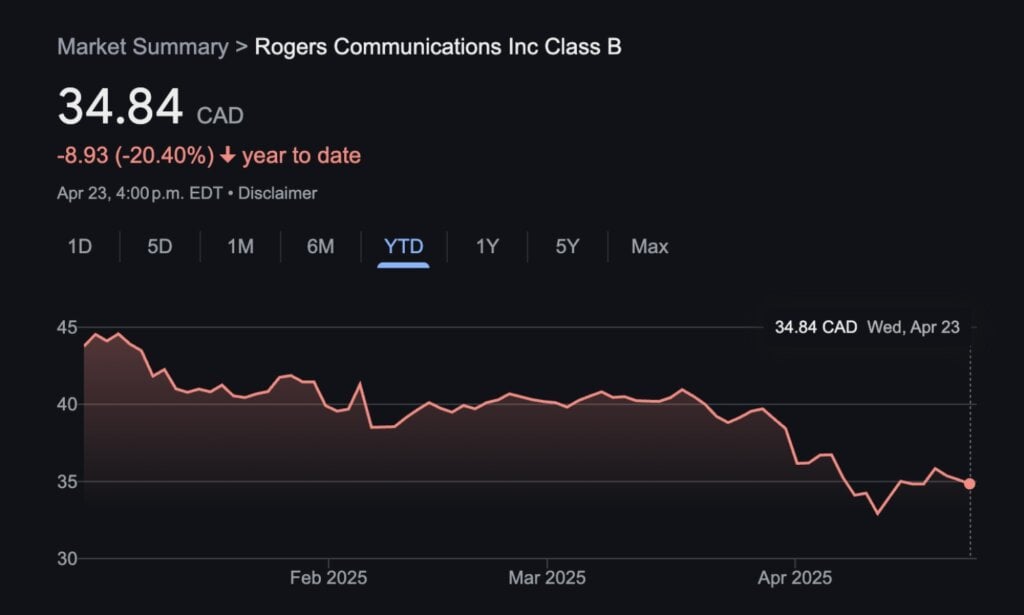
The chief executive of Rogers Communications Inc. says the company is keen to unlock underappreciated value from its growing collection of sports assets after extending its national hockey broadcast rights and signing a deal to expand its stake in Maple Leaf Sports & Entertainment.
Rogers believes its sports portfolio is now “unrivalled in Canada” and among the “best in the world,” said president and CEO Tony Staffieri on Wednesday, but he acknowledged that value isn’t reflected in its share price.
“Our priority is to change this,” Staffieri said in his prepared remarks to analysts on Rogers’ first-quarter earnings call.
“Sports assets continue to appreciate significantly in value and that’s why investors remain very interested in holding a minority position in these appreciating assets.”
For now, he said the company is focused on closing its $4.7-billion deal with BCE Inc., the owner of rival telecom company Bell Canada, to acquire its 37.5% stake in the conglomerate that owns the NHL’s Toronto Maple Leafs, NBA’s Raptors, CFL’s Argonauts, MLS’ Toronto FC and AHL’s Marlies.
The deal “keeps iconic Canadian teams in Canadian hands,” said the company’s executive chair Edward Rogers on Wednesday during its annual general meeting, where he emphasized the telecom’s Canadian roots and local investments amid trade tensions with the U.S.
Once that deal closes, which is expected midway through this year, Rogers would own a 75% stake in MLSE.
Rogers chief financial officer Glenn Brandt said that combined with Rogers’ existing ownership of the Toronto Blue Jays and the baseball club’s home stadium, the company’s total sports assets would be worth around $15 billion.
“We are more aware than the market is reflecting right now of the value of those assets on our balance sheet,” said Brandt.
“Others talking to us also understand that value.”
While Rogers intends to hold a controlling interest in MLSE, some analysts have speculated it could look to sell a minority stake to investors.
Brandt said Rogers is already in discussions with “various institutional investors” that have expressed “substantial” interest as the company awaits league and regulatory approvals of the MLSE deal.
“It’s premature for me to start speculating on when that might result in a transaction,” he said.
“We will explore those opportunities with a very open mind.”
Earlier this month, Rogers also announced a 12-year, $11-billion agreement for the national rights to NHL games in Canada starting in the 2026-27 season. The deal will kick in following the conclusion of its current 12-year deal it signed for $5.2-billion.
“These national media rights, now locked in until 2038, are the most valuable media rights in Canada,” said Staffieri.
“The first deal was profitable and successful for Rogers and Sportsnet, and we plan to build on this over the next 12 years.”
Rogers’ recent sports splurge did raise the eyebrows of at least one shareholder at its annual meeting, who pressed the company’s leadership about the Toronto Blue Jays’ decision this month to hand star player Vladimir Guerrero Jr. a 14-year, USD$500 million contract extension.
“Did that come to the board for a decision, or who makes the decision to spend something like $700 million on a baseball player?” the shareholder said, using an approximate conversion to Canadian dollars.
Edward Rogers said Blue Jays management brought the proposed Guerrero contract to him and Staffieri before the full Rogers board granted approval.
“It’s a very large bet,” said Rogers.
“It’s a lot of money, but in the context of where sports is today, and for the performance we’re getting, we think it was a good investment.”
Rogers’ shares were trading for $35.07 around noon Wednesday, down 0.1%, after the company reported its first-quarter profit rose compared with a year ago.
It said it earned $280 million or 50 cents per diluted share for the quarter ended March 31, up from a profit of $256 million or 46 cents per share in the same quarter last year. Revenue for the three-month period totalled $4.98 billion, up from $4.90 billion a year earlier.
The company said wireless service revenue was up 2% from a year ago as its subscriber base grew, while wireless equipment revenue fell three per cent on lower device sales.
Media revenue rose 24%, boosted by higher sports-related revenue, including at the Toronto Blue Jays, and higher subscriber and advertising revenue. Cable revenue fell 1%.
The results came as Rogers reported 34,000 total mobile phone net subscriber additions, including 11,000 postpaid—down from 98,000 postpaid additions in the same quarter last year.
Rogers’ monthly churn for net postpaid mobile subscribers—a measure of those who cancelled their service—was 1.01%, down from 1.10% during its previous first quarter.
The company recorded 23,000 prepaid net additions in the quarter, compared with a loss of 37,000 subscribers in the first quarter of 2024.
Meanwhile, Rogers’ mobile phone average monthly revenue per user was $56.94, down from $58.06 in the first quarter of the prior year.
Retail internet net additions totalled to 23,000.
On an adjusted basis, Rogers said it earned 99 cents per diluted share, the same as the first quarter of 2024.
Staffieri said the results came against a backdrop of slower growth in the telecom sector, driven by lower immigration levels.
“The company continues to exercise strong cost control to offset top-line pressures,” said Scotiabank analyst Maher Yaghi in a note.
“Overall results were in line with expectations and, given the significant drag in stock performance lately, we would not be surprised to see a relief rally in the stock; however, the outlook remains sluggish.”
Teck CEO foresees higher copper, zinc demand amid global economic uncertainty
Teck Resources Ltd Class B (TSE: TECK.B)
- Q1 profit: $370 million or 73 cents per diluted share, compared with a loss of $125 million or 24 cents per diluted share a year earlier.
- Revenue for the quarter: $2.29 billion, up from $1.62 billion.
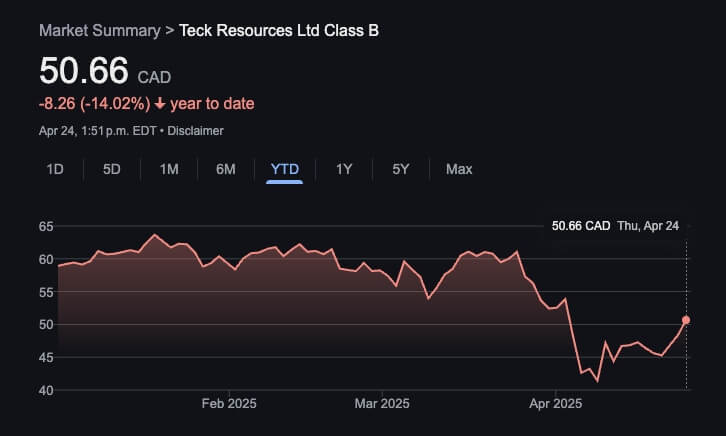
The chief executive of mining giant Teck Resources Ltd. says the threat of a global economic downturn may be looming, but he’s expecting the volatility to drive up demand for the copper and zinc it produces.
“These metals are essential for global manufacturing and development, industrial policy and national security, electrification infrastructure, as well as the growth of the digital economy,” Jonathan Price told analysts on a conference call Thursday to discuss the company’s first-quarter results.
The United States has thrown global trade into chaos with its on-again, off-again tariffs, and other countries have retaliated, raising the spectre of a global economic slowdown.
Price said many economies are now looking to shore up their industrial sectors amid the turbulence.
“For example, defence spending may be significantly broadened to include areas central to economic resilience, such as upgrades to and expansion of electricity grids, which remain central to copper demand,” he said.
“We see this providing a medium-term boost to metals demand as the world enters into a state-backed, more capital intensive phase of growth.”
rice said Teck’s copper and zinc concentrate are sold in Asia and Europe, so they are not directly affected by U.S. tariffs. But production from its Red Dog mine in Alaska is subject to Chinese tariffs on U.S. exports, representing less than a fifth of its zinc and lead concentrate sales, Price said.
“We have successfully developed a regionally diverse customer base, which gives us greater optionality while trade negotiations are ongoing,” he said.
The Vancouver-based company completed the sale of its steelmaking coal business last summer.
Teck said there were challenges during the first quarter at the Quebrada Blanca copper mine located high in the mountains of northern Chile. There was an 18-day shutdown for maintenance and reliability work, as well as a countrywide power outage and bad weather. Teck holds 60% of QB, alongside Japanese and Chilean partners.
As a result of the issues at QB, the company expects 2025 copper production to come in at the low end of its forecast range of 230,000 and 270,000 tonnes and costs to be at the higher end of its forecast range of USD$1.80 to USD$2.15 per pound.
Also Thursday, Teck said higher commodity prices and copper sales volumes boosted its first-quarter profit as its revenue rose.
Profit from continuing operations attributable to shareholders amounted to $370 million or 73 cents per diluted share for the quarter ended March 31, compared with a loss of $125 million or 24 cents per diluted share in the same quarter last year.
On an adjusted basis, Teck says its profit from continuing operations amounted to 60 cents per diluted share for its latest quarter, compared with an adjusted loss of a penny per diluted share a year earlier.
Revenue for the quarter totalled $2.29 billion, up from $1.62 billion.
The company’s realized copper price for the quarter was USD$4.27 per pound, up from USD$3.86 a year earlier, while it realized USD$1.28 per pound for zinc, up from USD$1.12 in the same quarter last year.
National Bank of Canada signs deal to buy PGM Global Holdings
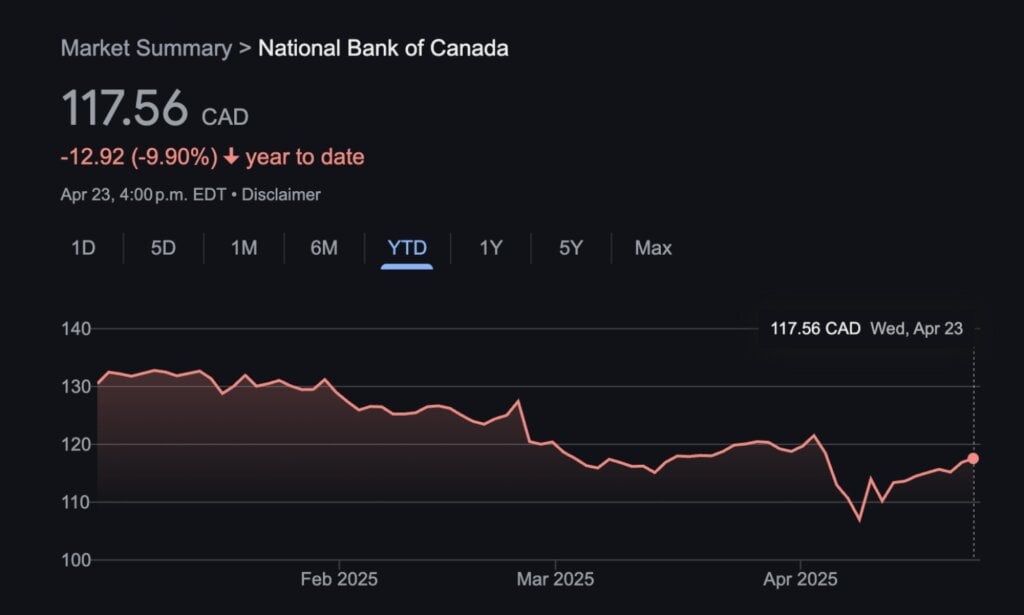
National Bank of Canada has signed a deal to buy PGM Global Holdings Inc., the parent company of PGM Global Inc. which is a Montreal-based provider of institutional trading services.
Terms of the agreement were not immediately available, though National Bank said the value of the deal would not have a material impact on its financial position.
The bank says PGM Global will complement the services offered by National Bank Independent Network, which offers custody, trade execution, and brokerage services to independent wealth management firms.
National Bank also says PGM Global’s dual registration with both the Canadian Investment Regulatory Organization and the Financial Industry Regulatory Authority in the U.S. will improve its ability to cater to expanding client needs.
PGM Global chief executive Patrick Belland says the company is confident the deal will create significant advantages for the clients it serves.
The deal is expected to close in late spring this year, subject to closing conditions and regulatory approvals.
Musk says he’ll spend more time running Tesla after its profit plunges
Tesla Inc (NASDAQ: TSLA)
- Q1 profits: $409 million or 12 cents a share, down from $1.39 billion a year earlier.
- Revenue for the quarter: $19.3 billion, down from $21.3 billion a year earlier.
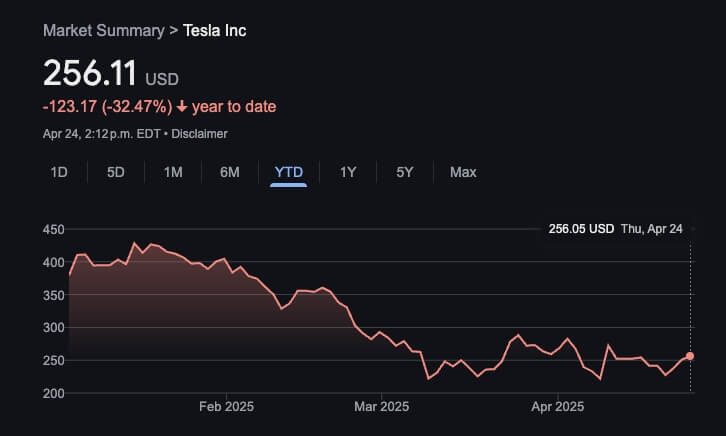
Elon Musk says he’ll be spending less time in Washington slashing government costs and more time running Tesla after his electric vehicle company reported a big drop in profits.
Musk said on a conference call with analysts Tuesday that “now that the major work of establishing Department of Government Efficiency is done,” that he will be “allocating far more of my time to Tesla” starting in May. Musk said he now expects to spend just “a day or two per week on government matters.”
Tesla struggled to sell vehicles as it faced angry protests over Musk’s leadership of DOGE, a jobs-cutting group that has divided the country. The Austin, Texas, company reported a 71% drop in profits and a 9% decline in revenue for the first quarter.
“Investors wanted to see him recommit to Tesla,” said Wedbush Securities’ Dan Ives. “This is a big step in the right direction.”
Investors sent Tesla shares up more than 5% in after-hours trading, although they are still down more than 40% for the year.
The company reconfirmed that it expects to roll out a cheaper version of its best-selling vehicle, the Model Y sport utility vehicle, in the first half of this year. It also stuck with its predictions that it will be able to launch a paid driverless robotaxi service in Austin in June and have much of its fleet operating by itself next year.
“There will be millions of Teslas operating autonomously in the second half of the year,” Musk said in a conference call after the results were announced. He later added about the personal use of autonomous vehicles, “Can you go to sleep in our cars and wake up at your destination? I’m confident that will be available in many cities in the U.S. by the end of this year.”
Auto analyst Sam Abuelsamid at Telemetry Insight said he doubts Musk’s predictions.
“The system is not robust enough to operate unsupervised. It still makes far too many errors,” he said. “It will suddenly make mistakes that will lead to a crash.”
The planned rollout of the robotaxi without a steering wheel or pedals comes as federal regulators still have open investigations into whether the technology that Tesla hopes will allow cars to drive themselves is completely safe.
Tesla’s driver-assistance technology that can steer or stop a car but still requires humans to take over at any time—its so-called Autopilot—is being probed by the National Highway Traffic Safety Administration for whether it alerts drivers sufficiently when their attention wanders. And the company’s Full Self-Driving, which is only partial self-driving and has drawn criticism for misleading drivers with the name, has come under scrutiny for its tie to accidents in low-visibility conditions like when there is sun glare.
Another challenge to Tesla, which once dominated the EV business: It is facing fierce competition for the first time.
Earlier this year, Chinese EV maker BYD announced it had developed an electric battery that can charge within minutes. And Tesla’s European rivals have begun offering new models with advanced technology that is making them real Tesla alternatives just as popular opinion has turned against Musk. The Tesla CEO has alienated potential buyers in Europe by publicly supporting far-right politicians there.
Tesla said Tuesday that quarterly profits fell from $1.39 billion to $409 million, or 12 cents a share. (All figures in U.S. dollars.) That’s far below analyst estimates. Tesla’s revenue fell from $21.3 billion to $19.3 billion in the January through March period, also below Wall Street’s forecast. Tesla’s gross margins, a measure of earnings for each dollar of revenue, fell from 17.4% to 16.3%.
Tesla has said it will be hurt less by the Trump administration’s tariffs than most U.S. car companies because it makes most of its U.S. cars domestically. But it won’t be completely unscathed. It sources some materials for its vehicles from abroad that will now face import taxes.
Tesla warned in announcing its results that tariffs will hit its energy storage business, too.
Retaliation from China will also hurt Tesla. The company was forced earlier this month to stop taking orders from mainland customers for two models, its Model S and Model X. It makes the Model Y and Model 3 for the Chinese market at its factory in Shanghai.
The company’s side business of selling “regulatory credits” to other automakers that fall short of emission standards boosted results for the quarter.
Tesla generated $595 million from credit sales, up from $442 million a year ago.
The company generated $2.2 billion in cash flow versus $242 million a year earlier.
Morningstar analyst Seth Goldstein said earlier reports of plunging sales that had tanked the stock made the quarterly results almost predictable.
“They’re not particularly surprising given that deliveries were down,” he said. “It was good to see positive cash flow.”
MoneySense’s ETF Screener Tool
Read more about investing:
- Best ETFs in Canada
- Cineplex, Roots and Delta Air Lines report earnings
- Canadian companies facing supply-chain challenges in wake of U.S. tariffs
- Buying your first stocks in Canada
The post Stock market news for investors: Musk to spend more time running Tesla, Rogers hopes there’s upside to sports, and more appeared first on MoneySense.



